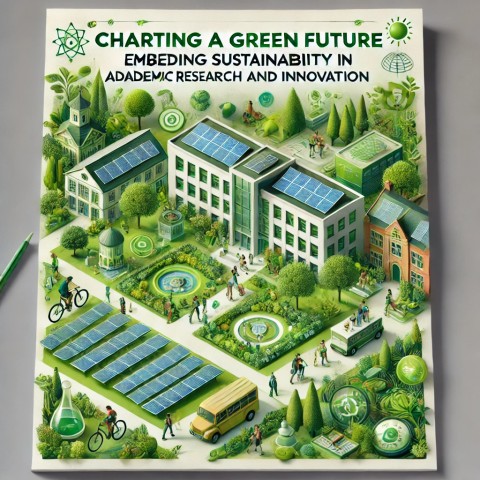Towards a sustainable future: integrating environmental responsibility into research and innovation
Newsletter
Dear fellow MCAA members,
As we navigate the rapidly evolving academic landscape, the June 2024 Special Issue of the MCAA Newsletter focuses on a theme of paramount importance: integrating sustainability into research and innovation. This issue aims to illuminate the critical intersection between environmental responsibilities and academic endeavors.
A time for change
The urgency for sustainable practices within academia has never been more pressing. Our current era, marked by swift technological advancements and increasing global challenges, demands that we rethink our approach to research and innovation. The dual imperatives identified by Martinuzzi et al. (2018)—the need for rapid innovation and the imperative to maintain public trust through socially valuable contributions— highlight the critical balance we must achieve.
These challenges resonate across academia, where the integration of Responsible Research and Innovation (RRI) practices can serve as a critical pathway to achieving a more sustainable and responsible academic culture. RRI encourages institutions to adopt a framework that balances innovative efforts with considerations for societal and environmental impacts, promoting a culture that values sustainability alongside scientific advancement. This approach aligns with the growing recognition of the environmental responsibilities that come with academic research and the broader impact of these activities.
Aligning with global goals
Integrating these insights, the European Green Deal, with its ambitious targets such as achieving climate neutrality by 2050 and reducing greenhouse gas emissions by 55% by 2030, serves as a guiding initiative for our efforts (European Commission, The European Green Deal). The MSCA Green Charter further underlines the commitment required from all sectors, including academia, to contribute meaningfully to these goals (European Commission, MSCA Green Charter). Research infrastructures are also uniquely positioned to lead by example, integrating sustainable practices into both their research outputs and operational processes (European University Association, 2022).
A recent study by the European Commission on the MSCA Green Charter, based on a 2023 survey of projects from the 2021 calls, revealed insightful trends (European Commission, 2024). While awareness of the Green Charter and the European Green Deal was less than half among respondents, over 60% indicated their institutions already promote sustainable research. Common practices included using teleconferencing to minimize travel, promoting greener travel options, raising sustainability awareness, and reducing energy and water consumption. Respondents also highlighted the need for more guidance and financial support from the Commission to further adopt sustainable practices.
Institutional transformation
Transforming our institutions to support sustainability requires a strategic and systematic approach. Beringer and Adomßent (2008) and Lüdeke-Freund (2020) emphasize the need for holistic changes that encompass academic pursuits and campus operations. This transformation is not merely about reducing environmental footprints but about embedding sustainability into the very fabric of our academic culture.

Shrivastava et al. (2020) and Ruiz-Mallén and Heras (2020) advocate for a transdisciplinary approach to sustainability science, one that bridges the gap between natural sciences, social sciences, and humanities. This comprehensive approach is crucial for addressing the complex challenges of our time and for aligning academic institutions with the global Agenda 2030 of Sustainable Development Goals.
A call to action
As we move forward, it is imperative that we reassess and realign our research methodologies and institutional policies to reflect the principles of RRI. This alignment will not only enhance the sustainability of our research processes but also foster a culture of sustainable behavior, responsibility and responsiveness within academia.
The journey towards sustainability is both challenging and rewarding. By embracing innovative methods, fostering community engagement, and promoting education on sustainable practices, we can make significant strides in creating a more sustainable academic environment. Our collective efforts will ensure that our research not only advances scientific knowledge but also contributes positively to society and the environment.
Takeaways
The integration of sustainability into academic research and innovation is not merely an option but a necessity. As we align with global goals such as those set by the European Green Deal and the MSCA Green Charter, we must recognize our unique position to lead and influence sustainable practices. Through strategic green transformations and a committed approach to RRI, we can ensure that our academic activities not only push the boundaries of knowledge but also safeguard the environment and society.
Let us embrace this challenge and opportunity to create a lasting impact. By working together and supporting one another in our sustainability efforts, we can achieve a future where academic excellence and environmental stewardship go hand in hand.
Alexandra Dubini
Guest Editor
MCAA Sustainability General Interest Group
alexandra.dubini@mariecuriealumni.eu
@alexdubini
Mariana Rosca
Guest Editor
MCAA Sustainability General Interest Group
roshcam@yahoo.com
Polat Goktas
Guest Editor
MCAA Editorial Board
polat.goktas@ucd.ie
@PolatGoktass
References:
Beringer, A., & Adomßent, M. (2008). Sustainable university research and development: inspecting sustainability in higher education research. Environmental Education Research, 14(6), 607-623.
European Commission. The European green deal. https://commission.europa.eu/strategy-andpolicy/priorities-2019-2024/european-green-deal_en
European Commission. MSCA green charter. https://marie-sklodowska-curie-actions. ec.europa.eu/about-msca/msca-green-charter
European Commission. (2024). New study published on uptake of the MSCA Green Charter under Horizon Europe. https://marie-sklodowska-curie-actions.ec.europa.eu/news/newstudy-published-on-uptake-of-the-msca-green-charter-under-horizon-europe
European University Association. (2022). A university vision for the European Green Deal. https://eua.eu/resources/publications/1013:a-university-vision-for-the-european-greendeal.html
Lüdeke-Freund, F. (2020). Sustainable entrepreneurship, innovation, and business models: Integrative framework and propositions for future research. Business Strategy and the Environment, 29(2), 665-681.
Martinuzzi, A., Blok, V., Brem, A., Stahl, B., & Schönherr, N. (2018). Responsible research and innovation in industry—Challenges, insights and perspectives. Sustainability, 10(3), 702.
Ruiz-Mallén, I., & Heras, M. (2020). What sustainability? higher education institutions’ pathways to reach the agenda 2030 goals. Sustainability, 12(4), 1290.
Shrivastava, P., Smith, M. S., O’Brien, K., & Zsolnai, L. (2020). Transforming sustainability science to generate positive social and environmental change globally. One Earth, 2(4), 329- 340.